|
|
|
Sort Order |
|
|
|
Items / Page
|
|
|
|
|
|
|
| Srl | Item |
| 1 |
ID:
128550
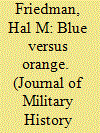

|
|
|
|
|
| Publication |
2014.
|
| Summary/Abstract |
In the fall of 1945, the United States Naval War College (NWC) began its transition from a reduced wartime status to a peacetime stance as the Navy's premier postgraduate school. Because the war ended so quickly, the NWC was not able to change its curriculum for 1945-1946, which had been planned the previous academic year. It is therefore not surprising to find that the primary supposed enemy for Blue (the United States) in the coming academic year was still Orange (Japan). This study looks at the Operations Problems simulated at the immediate end of the war and explores the mix of interwar and wartime doctrine that was employed to prepare for the early Cold War.
|
|
|
|
|
|
|
|
|
|
|
|
|
|
|
|
| 2 |
ID:
128553
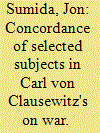

|
|
|
|
|
| Publication |
2014.
|
| Summary/Abstract |
This concordance of the standard English translation of Carl von Clausewitz's On War by Michael Howard and Peter Paret breaks new ground in two important respects. First, it indexes the text in unprecedented detail by listing references to every significant proposition and distinctive phrase under major subject headings. Second, information about the location of indexed items includes the book and chapter of On War, and page numbers in both current editions of the standard translation.
|
|
|
|
|
|
|
|
|
|
|
|
|
|
|
|
| 3 |
ID:
128552
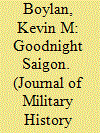

|
|
|
|
|
| Publication |
2014.
|
| Summary/Abstract |
This article tests the veracity of the Revisionist thesis that the United States effectively won the Vietnam War in the years after Tet 1968. Since quantitative indicators could not accurately measure who was winning the "War in the Villages," it relies instead upon qualitative assessments made by U.S. Province Senior Advisors-the Americans best qualified to make such judgments. It is organized into three sections dealing with the key Revisionist claims that the Vietcong insurgency was defeated, the Saigon regime gained control of practically the entire rural population, and the South Vietnamese armed forces became capable of standing on their own.
|
|
|
|
|
|
|
|
|
|
|
|
|
|
|
|
| 4 |
ID:
128545
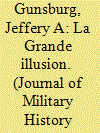

|
|
|
|
|
| Publication |
2014.
|
| Summary/Abstract |
Following the defeat of Germany in 1918, the dissolution of the Allied coalition and the gradual liberation of Germany from restrictions on its armed might, placed the neighboring Benelux countries before the dilemma of how to defend themselves against resurgent German aggression. The Netherlands and Luxemburg chose to rely on neutrality; Belgium at first flirted with the idea of joint defense with France, but from 1936, influenced among other things by the growing mechanization of warfare, embraced la grande illusion: that it could deter its neighbors from using its territory in case of a new war. Pursuance of this illusion until Germany actually attacked, together with the failure of the Netherlands and Belgium to create a joint defense, played a decisive role in the catastrophic Allied defeat of May 1940.
|
|
|
|
|
|
|
|
|
|
|
|
|
|
|
|
| 5 |
ID:
128543
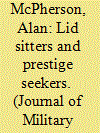

|
|
|
|
|
| Publication |
2014.
|
| Summary/Abstract |
This article argues that U.S. occupations in the Dominican Republic, Nicaragua, and Haiti in the first third of the twentieth century lasted as long as they did for political reasons. U.S. military commanders disagreed with civilians in the State Department partly because of a lack of both policy guidance and interdepartmental coordination. In addition, State grew more sensitive than Navy to negative public opinion both foreign and domestic and to national political strategy. Marines, meanwhile, were more driven to reform the societies they occupied but also less sensitive to their own abuses, to changing norms, and to geopolitical reasons for ending occupations.
|
|
|
|
|
|
|
|
|
|
|
|
|
|
|
|
| 6 |
ID:
128554


|
|
|
|
|
| Publication |
2014.
|
| Summary/Abstract |
As readers of this journal surely know, Jeremy Black is an extraordinary prolific historian, and he has been a persistent critic of the military revolution thesis while simultaneously advocating a more global approach to military history
|
|
|
|
|
|
|
|
|
|
|
|
|
|
|
|
| 7 |
ID:
128537
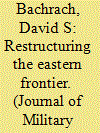

|
|
|
|
|
| Publication |
2014.
|
| Summary/Abstract |
The military achievements of Otto I of Germany (r. 936-973) tend to overshadow those of his father Henry I (r. 919-936). It was the first king of the Saxon dynasty, however, who established the foundations of the German Empire. One important development was the creation of a defense-in-depth against Hungarian raiders between the Saale and Elbe rivers. From the mid-920s through the mid-930s, Henry I secured this region through the construction of dozens of fortifications with garrisons able to interdict hostile forces. This study traces the steps by which Henry achieved his military aims, and discusses how the study of military affairs illuminates the administration of the Ottonian kingdom.
|
|
|
|
|
|
|
|
|
|
|
|
|
|
|
|
| 8 |
ID:
128549


|
|
|
|
|
| Publication |
2014.
|
| Summary/Abstract |
In September 1945, British intelligence officer Hugh Trevor-Roper was asked to investigate the circumstances surrounding the death of Adolf Hitler. Two years later, he published his conclusions in The Last Days of Hitler, still recognized as the standard work. But, despite some delving into the subject in a recent biography of the author by Adam Sisman, it has remained unclear until now how Trevor-Roper managed to so rapidly gather the evidence on which his book is based. The account below, rooted in heretofore unseen or underused archival sources, highlights the crucial but unacknowledged support Trevor-Roper received from Allied intelligence services and from a timeline drafted by intelligence officer Captain Humphrey Searle, later a well-known composer, that combined all of the data assembled into a single record of events of the last days in the Führerbunker.
|
|
|
|
|
|
|
|
|
|
|
|
|
|
|
|
| 9 |
ID:
128540
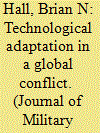

|
|
|
|
|
| Publication |
2014.
|
| Summary/Abstract |
This article seeks to contribute to recent scholarly analysis of the British Army's military performance and its leadership's willingness and ability to adapt during the First World War (1914-1918) by examining a maligned, though vital, aspect of its command and control system, communications. It offers a comparative assessment of the development and contribution of communications to British operations beyond the Western Front and concludes that the army was, on the whole, remarkably successful at adapting its communications system to suit the demands of fighting a modern, global conflict.
|
|
|
|
|
|
|
|
|
|
|
|
|
|
|
|
|
|
|
|
|